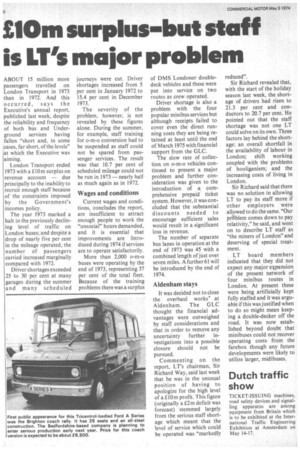11Orn surplus-but staff is LT's major problem
Page 22

If you've noticed an error in this article please click here to report it so we can fix it.
ABOUT 15 million more passengers travelled on London Transport in 1973 than in 1972. And this occurred, says the Executive's annual report, published last week, despite the reliability and frequency of both bus and Underground services having fallen "short and, in some cases, far short, of the levels" at which the Executive was aiming.
London Transport ended 1973 with a ElOm surplus on revenue account — due principally to the inability to recruit enough staff because of the constraints imposed by the Government's incomes policy.
The year 1973 marked a halt in the previously declining level of traffic on London buses; and despite a drop of nearly five per cent in the mileage operated, the number of passengers carried increased marginally compared with 1972.
Driver shortages exceeded 25 to 30 per cent at many garages during the summer and many scheduled journeys were cut. Driver shortages increased from 5 per cent in January 1972 to 15.4 per cent in December 1973.
The severity of the problem, however, is not revealed by these figures alone. During the summer, for example, staff training for o-m-o conversion had to be suspended as staff could not be spared from passenger services. The result was that 10.7 per cent of scheduled mileage could not be run in 1973 — nearly half as much again as in 1972.
Wages and conditions
Current wages and conditions, concludes the report, are insufficient to attract enough people to work the "unsocial" hours demanded, and it is essential that improvements are introduced during 1974 if services are to operate satisfactorily.
More than 2,000 o-m-o buses were operating by the end of 1973, representing 37 per cent of the total fleet. Because of the training problems there was a surplus of DIMS Londoner doubledeck vehicles and these were put into service on two routes as crew operated.
Driver shortage is also a problem with the four popular minibus services but although receipts failed to cover even the direct running costs they are being retained at least until the end of March 1975 with financial support from the GLC.
The slow rate of collection on o-m-o vehicles continued to present a major problem and further consideration was given to the introduction of a comprehensive prepaid ticket system. However, it was concluded that the substantial discounts needed to encourage sufficient sales would result in a significant loss in revenue.
The number of separate bus lanes in operation at the end of 1973 was 45 with a combined length of just over seven miles. A further 61 will be introduced by the end of 1974.
Aldenham stays
It was decided not to close the overhaul works at Aldenham. The GLC thought the financial advantages were outweighed by staff considerations and that in order to remove any uncertainty further investigations into a possible closure should not be pursued.
Commenting on the report, LT's chairman, Sir Richard Way, said last week that he was in the unusual position of having to apologize for the high level of a ElOm profit. This figure (originally a £2 m deficit was forecast) 'stemmed largely from the serious staff shortage which meant that the level of service which could be operated was "markedly reduced".
Sir Richard revealed that, with the start of the holiday season last week, the shortage of drivers had risen to 21.3 per cent and conductors to 20.7 per cent. He pointed out that the staff shortage was not one LT could solve on its own, Three factors lay behind the shortage: an overall shortfall in the availability of labour in London; shift working coupled with the problems of hooliganism; and the increasing costs of living in London.
Sir Richard said that there was no solution in allowing LT to pay its staff more if other employers were allowed to do the same. "Our prdblem comes down to pay relativity," he said, and went on to describe LT staff as "the miners of London" and deserving of special treatment.
LT board members indicated that they did not expect any major e4pansion of the present network of four minibus routes in London. At present these were being artificially kept fully staffed and it was arguable if this was justified when to do so might mean keeping a double-decker off the road. It was now established beyond doubt that minibuses could not recover operating costs from the farebox though any future developments were likely to utilize larger, midibuses.




























































































